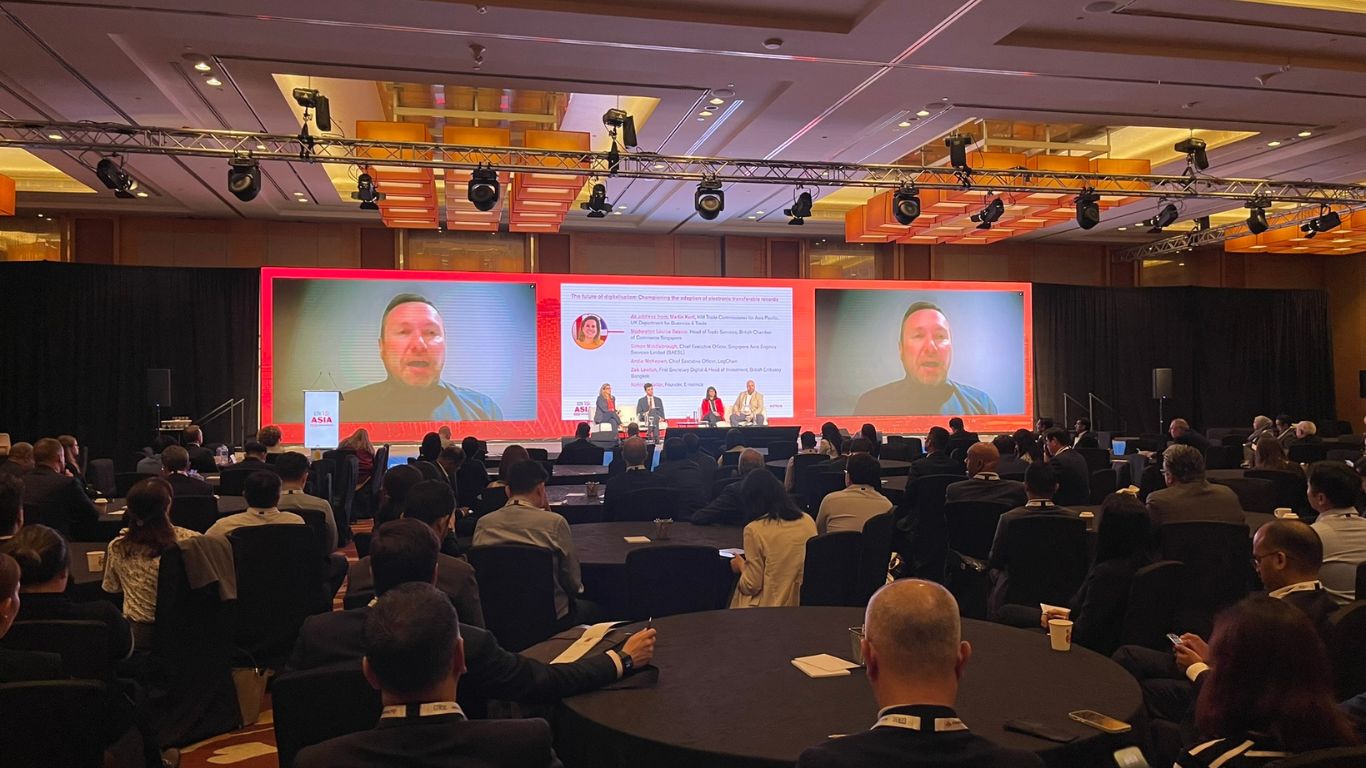Public-private partnership across UK Government and industry puts theory into practice on digitalising supply chains

The UK - Southeast Asia Trade Digitalisation Pilots project team on a panel at Global Trade Review Asia. From left to right: Louise Beazor (Head of Trade Services, British Chamber of Commerce Singapore); Zak Lawton (First Secretary Digital & Head of Investment, British Embassy Bangkok); Nimisha Tailor (Founder, E-nomics); and Andie McKeown (CEO, LogChain). Off-screen and also present on the panel: Simon Middlebrough, CEO of Singapore Aero Engine Services Pte Ltd (SAESL).
Source: Press Release
Each year, more than 28.5 billion paper trade documents are used globally¹. Documentation for a single shipment can require up to 50 sheets of paper that can be exchanged with up to 30 different stakeholders. In October 2023, the UK Government embarked on a series of digital supply chain pilots between the UK, Singapore and Thailand, led by the British Chamber of Commerce Singapore and with industry partner and co-sponsor LogChain. The UK – Southeast Asia Trade Digitalisation Pilots (TDP) was formed to deliver real-world shipments and demonstrate the commercial benefits of digitalising supply chain processes.
At today’s Global Trade Review Asia conference (GTR Asia) in Singapore, the outcomes from the TDP pilots were announced by His Majesty’s Trade Commissioner for Asia Pacific, Martin Kent, in a speech ahead of a panel discussion featuring the TDP project team and the CEO of Singapore Aero Engine Services Private Limited (SAESL), which partipcated in the project. Full details of the TDP are available in a public report, accessible on the British Chamber of Commerce Singapore website.

The TDP provided industry and technical support to companies to adopt trade digitalisation and deliver real-world shipments between the UK, Thailand and Singapore. The pilots - with successful businesses SAESL, Big C, and Johnson Partners - demonstrated real, quantifiable benefits. Each pilot resulted in reductions in paperwork, email traffic, and supply chain delays, and significantly increased productivity and efficiency.
In one example, SAESL, a joint venture between Rolls-Royce Plc and SIA Engineering Company which specialises in engine overhaul and component repair services, delivered an aerospace engine part for maintenance from Singapore to the UK via airfreight. The resulting efficiencies included:
- Reduction of cargo shipment time by 40%.
- Reduction in the use of paper trade documents by 89%.
- Reduction in related email traffic by 90%.
- Staff productivity increase of 67%.

In another, Big C, one of the leading retailers in Southeast Asia and the third modern retailer in Thailand, delivered food and beverages from the UK to Thailand via a containerised cargo shipment. Their efficiencies included:
- Reduction in the use of paper trade documents by 86%.
- Reduction in related email traffic by 91%.
Gary Hardy, Deputy CEO, Big C states:
“Thanks to the UK – Southeast Asia Trade Digitalisation Pilots, we’ve proved we can easily and efficiently import products from the UK.”
The TDP demonstrates that trade digitalisation is not a confusing or mystical technological advancement. It is a tangible and achievable goal that can be realised today by businesses small and large to make global trade faster, more cost effective, and more robust. Positive implications of trade digitalisation for businesses could include making their supply chains efficient, gaining a competitive advantage, or enabling greater security and visibility of the movement of goods. It could provide the opportunity for reduced costs, for staff to focus more time on value-added tasks and processes, and for the company to scale. Benefits could also extend to the wider trade ecosystem of distributors, logistics service providers, and excitingly provides the opportunity to connect to the work currently being done in trade finance and fintech.
As SAESL CEO, Simon Middlebrough, states:
“The TDP provided the opportunity to us to critically review our internal processes and to look to improve them through digitalisation. It was slightly uncomfortable – but important – to uncover some examples of supply chain processes where instead of seamless integration we found dis-jointedness and duplication. Through the TDP, our business can now look to both remedy these internal gaps and implement the digitalisation solutions to enable us to grow in a more scalable way and secure tangible bottom line benefits in our logistics and supply chain activities.”
British High Commissioner to Singapore, Nik Mehta, said:
“I am thrilled that the UK-Southeast Asia Trade Digitalisation Pilots are delivering tangible outcomes such as quicker, more efficient ways of working across supply chains. Businesses of all sizes and sectors can benefit from innovations in trade digitalisation. The learning developed in these pilots, along with the UK-Singapore Digital Economy Agreement, pave the way for even more UK and Singapore industry partners to collaborate on digital innovation.”
David Kelly, Executive Director of the British Chamber of Commerce Singapore, said:
“The British Chamber of Commerce Singapore is proud to be leading this critical work putting theory into practice on digitalising supply chains. Helping businesses to understand how digitalisation can work in real-life scenarios brings a level of practicality and commercial opportunity to conversations we have been having around the table with industry and Government.”
Andie McKeown, CEO of LogChain comments:
“The UK-Southeast Asia Trade Digitalisation Pilots have proven that trade digitalisation is no longer a distant goal—it’s an achievable reality today. By simplifying the process and delivering clear, measurable benefits, we’ve demonstrated that even the most traditional industries can unlock significant efficiencies and gain a competitive edge through digital transformation. The time to embrace this change is now, and LogChain is proud to have played a pivotal role in this journey.”
¹“Paperless Trade for UK Businesses to Boost Growth.” Department for Digital, Culture, Media and Sport, UK. October 2022.
